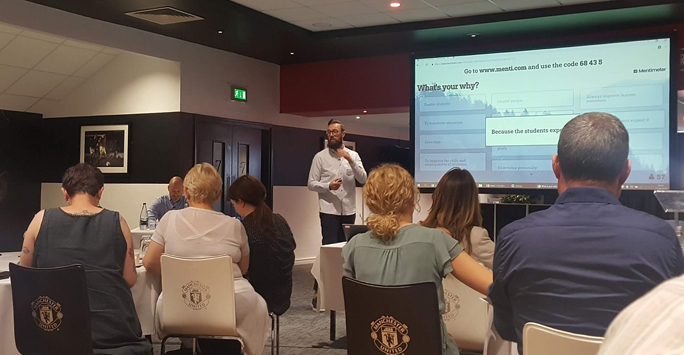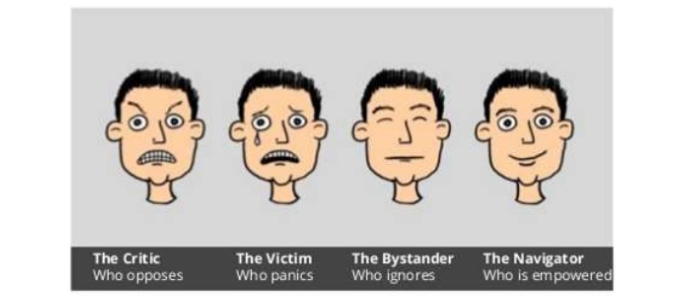JISC Connect More - 27th June 2019
Posted on: 20 August 2019 by Laura Blundell in Conference & Event Reports

Connect More is a JISC ran series of events designed to showcase how learning and teaching can be enhanced through the use of technology.
What is the event?
There were five events held across the UK and the conference theme this year was celebrating excellence. I attended the north event hosted at Old Trafford, Manchester.
An overview of the event
The Connect More conference included:
- A showcase of best practice, offering regional insights and practical takeaways
- An opportunity to try out emerging technologies (including immersive VR experience, Natalie 4.0) in the Digi Lab
- Networking with peers from across HE and FE as well as JISC representatives
What did you get out of the conference?
JISC Connect More was a packed event with lots of sessions, however I thought I’d use this blog post as an opportunity to reflect on the keynote which was delivered by Steven Hope, Head of Independent Learning at Leeds City College. Steven describes his role at Leeds as the bridge between technology and pedagogy. He is very open about the fact that educational technology is not a magic wand to improve teaching, the focus should always be on how we can use technology to enhance the learner experience. What resonated with me most about Steven is how unapologetically student centered his approach is, as I nodded profusely in agreement throughout the keynote, Steven discussed embracing technology for the benefit of our learners, it really isn’t about us, or our preferences or views or even skills, it’s about what will work best for our students and have the greatest impact on their learning.
However, the most effective way to enhance student experience is to support and inspire our staff. Steven summed this up perfectly; “Just enforcing the use of technology doesn’t always work. Staff need to have training, support and guidance for it to be used effectively. Get that right and it’s a game changer.”
At Leeds they have adopted the approach of staring with the why, so why are we doing what we are doing, what benefit will it have for our students pedagogically? This then allows for creating a culture that embraces new ways, it’s really important to be given the opportunity to try new things, even if they don’t quite work out the way we hoped. As teachers we provide that safe environment for our students to learn, so why don’t we allow ourselves the same opportunities as educationalists? This then leads to being able to create meaningful and purposeful professional development opportunities.
Ultimately what we are discussing here is change management. The image below is taken from Steven's keynote slides. It illustrates the four most likely faces of change that we might encounter when transforming culture. You will always encounter critics, and this is the reason the “why” is so important, if you know why you are doing something it’s easier to reason with a critic. The victim is the sort of person who feels that change has been forced upon them, and they panic, this is where the right culture in an organisation is effective, and support is crucial. The bystander is very much like the ostrich with its head in the sand, they ignore the inevitable change for as long as possible, and this again is why, if we foster a culture that inspires and supports people we stand a better chance of getting heads out of the sand. The navigator is where we want to end up, we want to empower people to not only navigate change, but to create change in order to enhance student experience.

Four faces of change we might encounter when transforming culture
Final thoughts
It was refreshing to listen to Steven and hear the successful change that has been implemented at Leeds City College. One stand out thing for me personally was how we still have a tendency to separate change that involves technology and low tech change to our teaching practice. Understandably digital tools have considerations that perhaps low tech alternatives do not, however I do feel that there is a separation between the types of change. Either low tech changes are not being given anywhere near as much credit as they deserve, or change that encompasses digital tools are still viewed with trepidation and fear. Or perhaps it’s something in the middle of the two? It will be interesting to see if in the future this gap begins to close, however ultimately anything new we try should aim to enhance the student experience, it’s about what it can do – that’s the whole point.
You can follow Steven on Twitter @Hope_Steven and me @laurablundell
Remember you can keep up to date with CIE events and if you want to contact us about bespoke sessions for your department, or if you’re embarking on a change of your own that we can support you with please get in touch cie@liverpool.ac.uk
Keywords: Technology, Elearning, Learning Technology, TEL, Conference, JISC, Digital Education, Change, Inspiration.